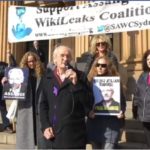UK Extends Extradition Appeal, So US Can Challenge Assange’s Suicide Risk

Two Royal Court judges in London agreed last Wednesday to extend the grounds upon which the US government can appeal the decision of the Westminster Magistrates’ Court not to permit the US to extradite Australian journalist Julian Assange to face espionage charges.
In July, the UK High Court granted the US permission to appeal the January decision of District Judge Vanessa Baraitser on limited grounds, which ruled out challenging her reliance on the assessment of psychiatrist Professor Michael Kopelman, who found Julian to be a suicide risk if locked up in the US.
Lord Chief Justice Holroyde agreed with the US argument on 11 August, which asserted Baraitser had placed too much weight upon Kopelman’s evidence, especially as it was “misleading”, in that it didn’t mention that Assange had fathered two children with his partner prior to his April 2019 arrest.
Therefore, the US can now attempt to pick holes in the assertion that the Wikileaks founder poses a self-harm risk if held under extreme isolation in a US correctional facility.
And a distraught Stella Moris, Julian’s partner, revealed to the press after the recent court decision was made that her name and that of her children had been kept secret by the psychiatrist and others due ongoing threats being made against their lives.
A clear and plausible risk
The transcript of 4 January decision not to extradite reveals that Assange had told psychiatrist Kopelman in December 2019 that he had suicidal thoughts “hundreds of times a day” and a “constant desire” to commit self-harm, which the professor considered “highly plausible”.
Although by August last year, the Australian journalist’s condition had improved somewhat. Kopelman put down to his being moved to the general population wing of London’s Belmarsh prison, which meant he was no longer in complete isolation as he had been in the healthcare unit.
Kopelman considered that with some of the supports available in the UK missing in the US, there would be “an abundance of known risk factors indicating a very high risk of suicide including the intensity of Mr. Assange’s suicidal preoccupation and the extent of his preparations”.
And despite the US legal team arguing that Kopelman was “misleading” in not disclosing his knowledge of Moris and the children, Baraitser noted in January that she was well aware of this fact, which she didn’t consider constituted any failure of duty to the court on the part of the psychiatrist.
Justice denied
Washington’s appeal of the refusal to extradite decision will take place in October. If successful, the Australian citizen will face eighteen charges that together carry a maximum penalty of 175 years in prison.
The UK has agreed to the appeal, and further allowed the grounds to be extended, despite key witness Sigurdur Thordarson – whose evidence is key to the 2020 superseding indictment – having admitted in June that he’d falsified his version of events to avoid serving prison time in the States.
Legal experts the world over have criticised the proceedings against Assange since his April 2019 arrest, maintaining that it violates the Australian’s human rights, it disregards the rule of law and it breaches the US-UK Extradition Treaty.
And despite all this happening to a Townsville-born Australian citizen, the Morrison government has not uttered a word to even question the lack of due process the multi-award-winning journalist has received.
Indeed, the federal Coalition’s continued silence simply serves to signal complicity.







